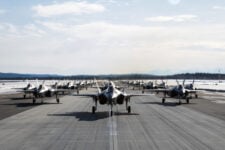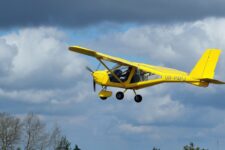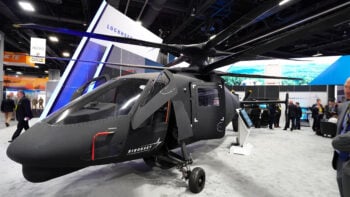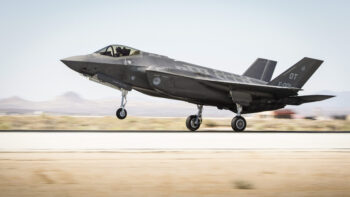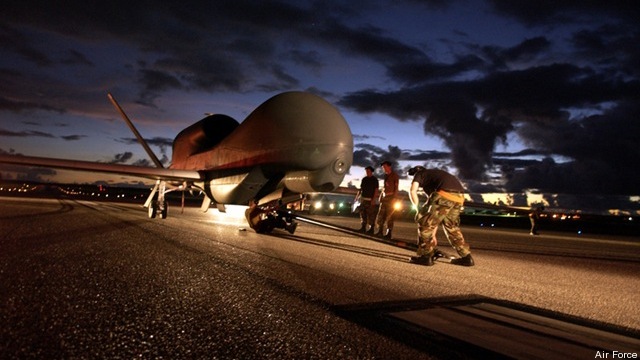 WASHINGTON: Despite the Pentagon’s decision to nix the Air Force’s Global Hawk unmanned aircraft from the arsenal in fiscal 2013, officials from prime contractor Northrop Grumman are staging an 11th-hour bid to get some of those planes back into the fleet.
WASHINGTON: Despite the Pentagon’s decision to nix the Air Force’s Global Hawk unmanned aircraft from the arsenal in fiscal 2013, officials from prime contractor Northrop Grumman are staging an 11th-hour bid to get some of those planes back into the fleet.
Company officials are working a plan to convince the department to proceed with planned purchases of the Block 30M, the latest version of the aerial drone, industry insiders tell Breaking Defense. The company’s best bet to salvage the program would be to get congressional support to put the Block 30Ms back into the department’s fiscal 2013 budget plan. The department plans to submit its fiscal 13 spending roadmap to lawmakers on Feb. 13.
The handful of Block 30Ms undergoing operational testing at Beale Air Force Base in Californian have performed well, insiders say. That performance, coupled with the drone’s past successes in Southwest Asia and Libya could be enough to convince Capitol Hill, according to insiders. The advanced intelligence, surveillance and reconnaissance payload aboard the Block 30M is comparable to the legacy U-2 spy plane. Air Force had planned to replace the Cold War-era ISR plane with the Global Hawk. But Pentagon officials opted to sideline all Block 30 versions of the drone in its fiscal 13 budget blueprint, unveiled last week.
In spite of the Block 30M’s performance during flight trials at Beale, the drone’s ISR payload were simply “not as capable” as are those of the U-2, Air Force Chief of Staff Gen. Norton Schwartz told reporters last Friday. “In this particular instance, the U-2 was the better bet,” Schwartz said unequivocally. To that end, the air service decided to discontinue buying all Block 30 versions of the aircraft and focus on developing the next-generation Global Hawk, known as the Block 40, in the coming years. The Block 40 will be the variant used by European allies as part of their Alliance Ground Surveillance program. This week, NATO agreed to buy five Block 40s for the program. As far as the Block 30 versions, the Air Force plans to put the remaining Block 30s in the fleet into “usable storage,” Schwartz said last week.
The NATO agreement could bolster Northrop’s case to the keep the Block 30s in the sky. But the agreement will likely help the company secure more foreign sales of the venerable ISR drone over the coming years. Northrop continues to eye potential sales of the Global Hawk to Japan, South Korea and Australia. Those possible sales could become even more critical to the company’s bottom line with the decision to cancel Block 30 production. But the department’s recent decision has already prompted one country to back away from the Global Hawk.
The South Korean military opted to extend operations of its U-2s in the fleet out to 2020, according to recent reports from Seoul. The decision was made to coincide with the Pentagon’s plans to ax the drone, according to officials from the country’s defense ministry. The Asian nation had been in negotiations with Washington over buying the Global Hawk. But bickering over the costs of the aircraft forced Seoul to put the deal on ice. The Pentagon’s cancellation of the program last week was the proverbial nail in the coffin for the potential South Korea deal.
Connecticut lawmakers to grill Army, Lockheed about job cuts at Sikorsky helicopter unit
“The Connecticut delegation has questions about why, with that [FY24] appropriation in hand, this happened,” said Rep. Joe Courtney, D-Conn.












